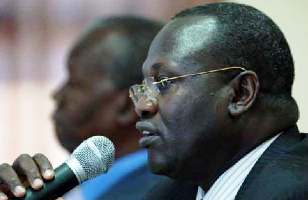Southerners living outside South Sudan since 1956 will not vote in the referendum – Machar
By James Gatdet Dak
June 24, 2010 (JUBA) – South Sudanese who have been living outside the territory of Southern Sudan since 1956 will not be allowed to vote in the referendum in their respective countries or regions of residence unless they migrate back to Southern Sudan, says the Vice President of the semi-autonomous region.

The three-day lectures which began on Monday at El-Semani Hall and ended on Wednesday were jointly organized by the Rift Valley Institute and the University of Juba. Issues to do with boundaries and borders, local justice and reconciliation in Sudan were also discussed. International lecturers among which included Professor Dr. Douglas Johnson as well as national lecturers such as Professor Siricio Orem participated in the debates.
Dr. Machar also presented brief remarks in light of the current situation in Sudan and post-referendum arrangements. A number of ministers and members of parliament from different levels of government in addition to hundreds of university students also attended the event.
He earlier on said borders should not be used as barriers between neighboring states because this would harm their needed mutual cooperation in other areas such as cross-border trades in addition to other common interests.
During Tuesday’s presentations on local justice and the role of traditional leaders, he said chiefs are still steering the democratic political power in Southern Sudan, adding that no politician would win elections without having been endorsed first by the chiefs of his or her constituency.
He added that the Interim Constitution of Southern Sudan also recognizes traditional leadership vested in the chiefs, who also administer local justice system. Even with the collection of household taxes since colonial period, official tax collectors collect taxes through chiefs by first going to the chiefs as the authority in the villages, instead of directly collecting from individual households, he said.
Dr. Machar also expressed the need to harmonize or try to strike a balance between various customary laws and statutory law in Southern Sudan.
During the debate on the topic, however, some commentators in the audience expressed concern that traditional authority has been undermined and disrespected in Southern Sudan.
Most of the Wednesday’s presentations were centered on the question of post-referendum citizenship in both Northern and Southern Sudan in case of separation in the next six months. Machar also explained to the audience that any southerner who has been living outside Southern Sudan since the time of independence in 1956 will have to come back to the South in order to get his or her voting right during the conduct of the referendum.
He also reminded them to read the referendum law, saying most of the issues lectured on have been handled in the document which was endorsed by the two parties and the national parliament. He however said there were nine outstanding post-referendum issues that needed to be tackled and among which is the question of citizenship.
On the question of whether southerners can continue to remain citizens in the North even if the referendum vote results to independence of the South, Machar who also chairs his ruling party’s negotiating team with the NCP pointed out that if the vote for secession of the South leaves the current Northern set up with the responsibility of the current Sudanese state, then southerners can lose their citizenship in the North.
He further added that this would, however, be different from a secession which would result to the dissolution of the current Sudanese state and formation of new re-emerging independent states.
(ST)

Kur
Southerners living outside South Sudan since 1956 will not vote in the referendum – Machar
Southerners in the NOrth should come home because they do not have any future in the dirty Northern system.
Kur
Akot Deng
Southerners living outside South Sudan since 1956 will not vote in the referendum – Machar
Mr Machar you are right those have been out before Sudan independent should only be spectators and the same will applied to those who claim their Southern citizenship after independent because the are not legible to vote.
Garang Ayiik
Southerners living outside South Sudan since 1956 will not vote in the referendum – Machar
Absolutly, deal with the intruders.
Thon Ayiik
DASODIKO
Southerners living outside South Sudan since 1956 will not vote in the referendum – Machar
Machar, please find them wherever they are; living now and supply them with means of transportation. Also I think if they failed to come and South Sudan has taken its independent; please advice them to move to Darfur or other marginalized areas. I have news that Jallabas are planing to kill all Southerners living in North Sudan after the independent of the South of Sudan. Alatib Mustafa the unlcle of Bashir the Folani guy instigated them to commit these crimes against the innocents. The last article he wrote, said: burn them, the infedils.